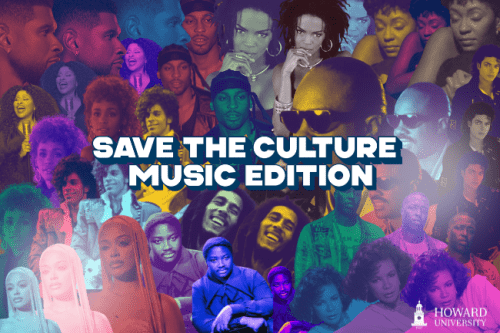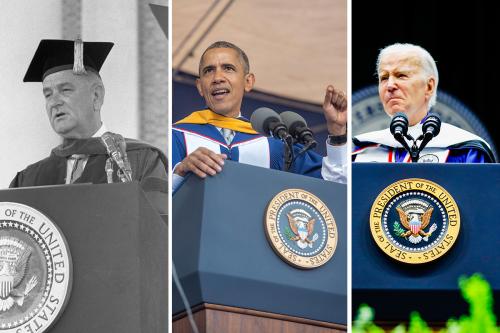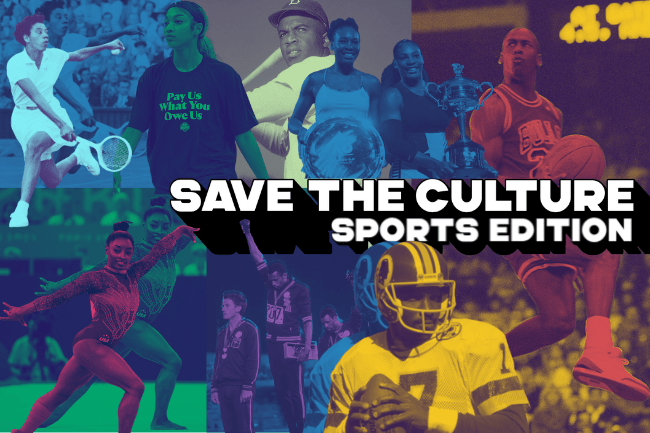Remember when time capsules were a thing?
For the uninitiated, groups of (mostly) students nationwide would accrue the items they felt best represented their era, stow said items in a container of some sort, and hide said container to be one day discovered by future generations as evidence of how we once did things on planet Earth.
Think of this, our SAVE THE CULTURE series, as a modernized version of the time capsule. In 2025, a quarter of the way into this pivotal century and nearly 100 years since the iconic Harlem Renaissance — an era that profoundly shaped Black artistic expression and cultural identity — this project feels especially urgent.
Throughout the summer, our editorial team will be designating 20 (or so) of the works most essential to understanding the Black American experience, in genres ranging from film and television to music and literature, and so much more in between. By spotlighting these landmark creations, we aim not only to preserve and honor the rich legacy of Black culture, but also to inspire ongoing dialogue, foster greater appreciation, and provide future generations with a vibrant record of how our culture thrived at this defining moment in history.
From shattering color barriers to sparking movements, from game-winning performances to culture-shifting moments, Black athletes have long turned sports into a stage for history. These moments are more than game highlights; they are milestones of resilience, pride, and Black power that have redefined what’s possible both on and off the field. In no particular order, here’s a look at 20 unforgettable events where Black excellence didn’t just play the game — it changed it.
Breaking Barriers, Making History
Jackie Robinson Breaks MLB’s Color Barrier
Jackie Robinson became the first Black player in Major League Baseball when the Brooklyn Dodgers called him up in 1947, integrating America’s pastime and enduring hostile racism with grace and excellence. Today, his number 42 is retired throughout the league and was the title of his biopic, amazingly played by Howard University alumnus Chadwick Boseman.
Althea Gibson Becomes the Queen of the Court
The first African American to win a Grand Slam title — the French Open in 1956 — Gibson would also become the first African American to win Wimbledon and the U.S. Nationals (now the U.S. Open), both in 1957. Her biography, “Born to Win: The Authorized Biography of Althea Gibson,” was co-authored by Howard University journalism professor Yanick Rice Lamb.
Wilma Rudolph Wins Three Gold Medals (1960 Olympics)
Overcoming polio and growing up in an under resourced community, Rudolph would persevere and become the first American woman to win three gold medals in a single Olympics in 1960, paving the way for greats like Jackie Joyner Kersee and Florence Griffith Joyner.
Arthur Ashe Gets the Last Word Against Jimmy Connors
Arthur Ashe and Jimmy Connors had an on-court and off-court rivalry that intensified during the 1975 Wimbledon final, which was won by Ashe, who defeated the top-seeded Connors in four sets. The win made Ashe the first Black man to win Wimbledon.
Serena and Venus Williams Revolutionize Tennis
With powerful play and undeniable pride in their Blackness, the Williams sisters rose from learning the game in Compton to dominating on courts at Wimbledon, the French Open and beyond, redefining women’s tennis, and inspiring a new generation to embrace the game. Between them, the sisters have 23 Grand Slam titles, 14 Grand Slam doubles titles and eight Olympic gold medals.
Clip of Arthur Ashe and Jimmy Connors during the 1975 Wimbledon Final.
Protest, Resistance, and Pride
Tommie Smith and John Carlos' Black Power Salute
Smith and Carlos’ silent protest on the medal stand at the 1968 Olympics became one of the most powerful political statements as the track and field stars called out systemic racism in the United States. The image remains one of the most iconic cultural moments in sports history.
Muhammad Ali Refuses Draft for Vietnam War
Born Cassius Clay, Ali risked his boxing career to stand on his principles in 1967 when he refused to be drafted, citing religious beliefs and opposition to the war. He was stripped of his boxing titles and banned from the sport, becoming a global symbol of Black resistance and anti-war sentiment.
Colin Kaepernick Kneels for Racial Justice
After a Super Bowl start for the San Francisco 49ers in 2013, Kaepernick sparked a movement by kneeling during the national anthem in 2016 to protest police brutality. Unable to land with a team after becoming a free agent in 2017, many felt he was blackballed from the NFL, making his kneel the silent protest heard around the sports world and beyond.
Jack Johnson Defeats Tommy Burns, Wins Heavyweight Title
Before a crowded arena in Sydney, Australia, Jackson Johnson soundly defeated Tommy Burns in 1908 to become the first African American to win the world heavyweight boxing championship. The 14-round TKO was also considered a significant step toward racial equality in sports.
- WNBA Players Push for Justice and Political Involvement
Players throughout the league used their platform during the bubble season in 2020 to amplify racial justice messages. More specifically, players on the Atlanta Dream wore T-shirts supporting the opponent of team co-owner Kelly Loeffler, helping to flip the state blue with the election of Raphael Warnock, Georgia’s first Black U.S. senator.
Clip from a February 2022 Atlanta News First report on the story behind the historic 1968 Olympic protest, featuring an interview with John Carlos.
Game-Changing Performances
Michael Jordan’s Flu Game
Playing through illness during Game 5 of the 1997 NBA Finals and scoring 38 points, Jordan cemented his place as one of if not the best players ever to grace an NBA court. The performance, which helped the Chicago Bulls win the series 4-2 over the Utah Jazz, symbolized the superhuman effort and excellence Jordan became known for.
Doug Williams Wins Super Bowl MVP
A proud HBCU product, having played for the great Eddie Robinson at Grambling State, Williams was the first Black quarterback to start — and win — a Super Bowl. Williams played the game of his career, leading the Washington Redskins over the Denver Broncos in 1988. This monumental moment in NFL history set the stage for future QBs like Steve McNair, Russel Wilson, Donovan McNabb, and Jalen Hurts.
Usain Bolt's Olympic Dominance
Redefining sprinting with charisma and dominance, Jamaican sprinter Usain Bolt became a symbol of Black excellence on a global stage when he won eight gold medals in the 2008, 2012, and 2016 Olympics — all while winning fans with his gregarious personality and showmanship. He even applied to have his famed victory pose trademarked in 2022.
Simone Biles Becomes G.O.A.T.
With unmatched athleticism and grace, Simone Biles more than earned her G.O.A.T. status becoming the most decorated gymnast in history, male or female. She became a household name with dominating and heartwarming performances in the 2016, 2020, and 2024 Olympics, and holds the record for the most combined World and Olympic medals with 37 (23 gold, 4 silver, 3 bronze at Worlds and 7 gold, 2 silver, 2 bronze at Olympics).
Jesse Owens Destroys Nazi Narrative
If “I Can Show You Better Than I Can Tell You” was a person, it was Jesse Owens. He immortalized his place in Olympic history by winning four gold medals at the 1936 Berlin Games. This was a significant feat considering it was done in front of Adolf Hitler, who spewed hate and racism by promoting Aryan racial supremacy.
CBS San Diego news clip from February 2024 celebrating 35 years since the historic Super Bowl 22 win led by quarterback Doug Williams.
Cultural Milestones
The Fab Five at Michigan
The group of young players at the University of Michigan — Chris Webber, Jalen Rose, Jimmy King, Juwan Howard, and Ray Jackson — revolutionized college basketball with Black culture — from baggy shorts and black socks to confidence and swag while taking the Wolverines to back-to-back NCAA appearances in 1992 and 1993. They also laid the foundation for the discussion of adequately compensating college athletes for their contributions to the institutions for which they play.
Howard University’s Golf Team Emerges
The rebirth of an HBCU golf program, backed by NBA All-Star Steph Curry, symbolized Black presence and excellence in a sport where they have traditionally been underrepresented. In just five years of existence, the men’s team has won back-to-back Northeastern Conference Championships, and the women’s team earned the highest GPA of any team in Howard University Athletics in 2025.
Deion Sanders Elevates HBCU Football at Jackson State
Known for his flashy persona as a college and NFL player, Deion “Prime Time” Sanders helped shine a national spotlight on HBCU football when he became the head coach at Jackson State University. His team won the SWAC in 2021 and 2022 and helped restore pride and shift narratives about HBCU sports.
The NBA Bubble and Black Lives Matter Platform
Days after then Utah Jazz center Rudy Gobert appeared to joke about the strange virus circulating in the early months of 2020 during a post-game press conference, the National Basketball Association made the stunning decision to suspend the season once Gobert displayed symptoms and the coronavirus became a full-fledged pandemic. But a few months later, the NBA resumed play in a “bubble” — a secure environment in Orlando, Florida where players, coaches, and essential staff lived and played in isolation. The bubble became a powerful platform for players to express their support for the Black Lives Matter movement, kneeling during the National Anthem and displaying calls for social justice on their uniforms such as “Say Their Names” and “Equality.”
Caitlin Clark–Angel Reese NCAA Championship Showdown
A cultural moment highlighting race, media bias, and unapologetic Black confidence — Reese’s "you can’t see me" gesture during LSU’s NCAA championship win over Clark’s Iowa team sparked major conversations. The two also brought a renewed level of excitement to the WNBA, creating a rivalry like the Larry Bird-Magic Johnson rivalry that helped rebrand the NBA in the 1980s.
From vision to reality: Howard University Golf is emerging as a powerhouse, serving as inspiration to a new generation of golfers and making its mark nationally and abroad. This 2024 clip highlights a "trip of a lifetime" for Howard students who competed at The Home of Golf at the Old Course in Scotland.
What moments celebrating Black excellence in sports history would you add to the list compiled by Howard’s senior director of athletics communications? Share them with us at magazine@howard.edu.
Related Story

SAVE THE CULTURE: Choosing Less than 25 Black Artists to Represent the “Best” of Black Music Is Nearly Impossible
Keep Reading
-

-
 News
NewsHoward University Honors Dr. James K. Fortson with Distinguished Alumni Award
Feb 13, 2026 4 minutes -

Find More Stories Like This
Are You a Member of the Media?
Our public relations team can connect you with faculty experts and answer questions about Howard University news and events.
Submit a Media Inquiry

